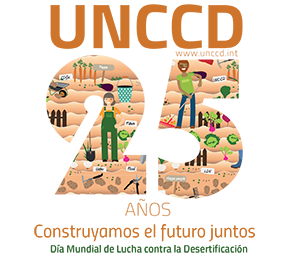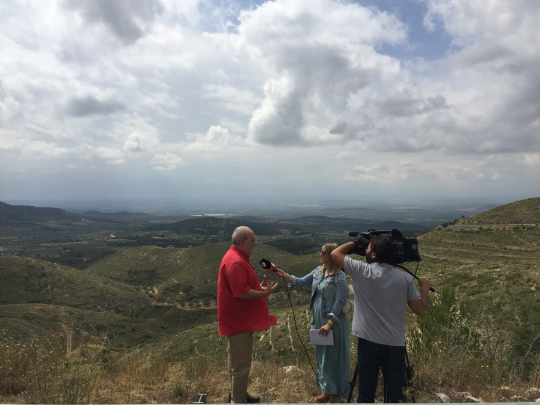
Today, 17 June, under the auspices of the United Nations, the World Day to Combat Desertification and Drought is celebrated under the slogan "Let's grow the future together".
Within the framework of this celebration, from the Desertification Research Centre (CIDE) we analyze the importance of these processes of degradation in the current context of climate change.
Today, 17 June, under the auspices of the United Nations, the World Day to Combat Desertification and Drought is celebrated under the slogan "Let's grow the future together".
https://www.un.org/en/events/desertificationday/
Within the framework of this celebration, from the Desertification Research Centre (CIDE) we analyze the importance of these processes of degradation in the current context of climate change.
Desertification processes are a historical heritage of human actions on the territory, whose main cause is related to changes in land uses, climate variations and overexploitation of natural resources, which do not consider the fragile balance of terrestrial ecosystems.
The term desertification implies the simultaneous degradation of three fundamental natural resources for the sustainable land management: soil, water and vegetation. It has important environmental, social and economic repercussions and mainly affects arid, semi-arid and dry sub-humid areas, which constitute a significant portion of the land surface (40%) and are the habitat and livelihood of a large part of the world population.
The risks of desertification in the arid and semi-arid zones of the planet, including the Mediterranean basin, and the proven trend of global warming of the Earth, are large-scale processes with feedback and interaction mechanisms of important consequences. Desertification is both an impact and a cause of climate change, and at the same time a consequence of the loss of biodiversity. Thus, the new approaches to the study of desertification propose a close relationship between it, the loss of biodiversity and climate change, where the soil-vegetation binomial plays a fundamental role in regulating the cycle of carbon and other greenhouse gases.
In a context of global change, the consequences of desertification processes are exported to other areas not directly affected and produce a multitude of trans-sectoral consequences. Among other aspects, it should be noted, the impacts on wildlife migration movements, the changes in atmospheric radiation flows, the effects on erosion / sedimentation dynamics and the alteration of hydrological cycles, changes in biogeochemical cycles and important consequences in human migrations as an effect of the impoverishment of the soil resource.
In our territory, the natural factors that operate within the global process of desertification are mainly of a climatic nature, but we must also include the geomorphological and biotic factors. The Mediterranean environments are characterized by highly variable climatic conditions, both spatial and temporal, with strong seasonal, inter-annual and medium-term variations in precipitation. The high rainfall variability, the reiteration of long summer and multiannual droughts and the generation of frequent storms of high erosive energy, create very favorable conditions for desertification processes.
Furthermore, the different climate change scenarios predict a general trend of aridification of our territory, caused by the increase in temperatures, and variations in precipitation patterns, as well as an increased risk of forest fires. Along with this, a high and sustained erosion rate over time will produce a reduction in the capacity of ecosystems to support the current amount of vegetation. At the same time, this degradation of the vegetation will in turn lead to more soil erosion in a negative feedback loop.
As it derives from all of the above, to understand the nature and the main processes of degradation that operate in our territory, although complex is essential for a sustainable management and mitigation of the dangers related to desertification.
Within the framework of this International Day, CIDE researchers transfer their scientific knowledge about desertification processes to citizens
https://www.youtube.com/watch?v=byqjFLfaafE
https://www.efeverde.com/noticias/20-del-suelo-espana-vulnerable-ante-desertificacion/
https://www.mitele.es/programas-tv/cuatro-al-dia/5d065515b95c9b58b48b4688/player/
(from minute 31:05)
Images:











